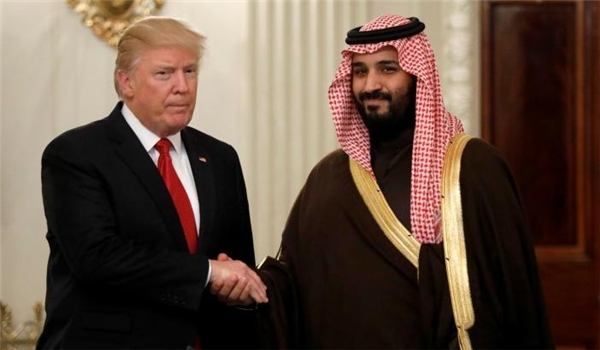
RNA - Trump is bragging about the illegal Saudi Arabia arms deal because he has a contract in hand for $110 billion in immediate sales, and in excess of $350 billion over the decade. There might be some cheap resolutions in the works, but for obvious reasons he is not going to have to fight the Congress and the Senate.
The ever-worsening humanitarian crisis in Yemen is because of the purposeful US-backed, Saudi-led war. There are no real concerns here that the US supply of arms is being seen internationally as tacit involvement. It will not lead to a majority of figures in Congress opposing the arms deal, let alone blocking “parts of the sale” that are particularly related to the Yemen war. Despite criticism from human rights groups and condemnations from the international civil society about making the Saudis, with their sketchy human rights record, recipients of a record US arms sale, there will be no pressure in both the House and the Senate to vote against the sale.
Those who voted in the past to facilitate the provision of bombs to the Saudis and service by Pentagon contractors on Saudi warplanes, won’t think twice before endorsing more sale of guided munitions, cluster bombs, warships, tanks, Apache helicopters, and war planes to the Saudis. Part of the $110 billion is a deal that had already been made by the Obama administration, and that portion was never blocked.
The obvious take-home is that this is a Congress that has formally declared war and authorized the use of military force at least 11 times in US history. It is yet to authorize the use of force against Syria, but that hasn’t changed the fact that the war is ongoing. It is instructive to look back at America's history of congressional war declarations, and it is worth a read at this particular juncture:
- Congress has not formally declared war since World War II. All of US wars in the Middle East have been authorized using other means, including two resolutions by United Nations Security Council, which rather goes to the heart of the nature of those different conflicts.
- It is possible to write such a sentence about Yemen and Syria today. After six years of failed regime change campaign (in the case of Syria) and over two years of backing Saudi Arabia’s failed regime change campaign (in the case of Yemen), a state of war exists between the US and Syria and the US and Yemen. That's why Congress doesn’t need to approve anything, including an authorization for the use of force against Syria.
- If history is any guide, Congress is not going to stop America’s open-ended commitment to the Saudis either, as fuzzy on the back-end as on the front. Lest we forget, it was on March 9, 1957, that the House authorized all US administrations “to undertake, in the general area of the Middle East, military assistance programs with any nation or group of nations of that area desiring such assistance.”
- Recent war authorizations include Lebanon (October 12, 1983), Iraq (January 12, 1991), permanent War on Terror (September 18, 2001), and Iraq (October 16, 2002). Ever since, citing resolutions passed by the UN Security Council, consecutive US governments have also had the undeclared authorization for use of military force against Afghanistan, Iraq, Syria, Yemen, Libya and a host of other countries. This precedent has been cited by subsequent presidents as justification for using military force without congressional authorization, as in Panama in 1989, Iraq in 1990, and Haiti and Bosnia in 1994.
- Irrespective of Congress crooks gaming International Law and International Humanitarian Law, continued sale of arms to Saudi Arabia, and specifically the arms used in airstrikes against Syrian and Yemeni civilians, is presumed to be “admittedly” permissible under the statutes covering most sales - and supplies - of military equipment by the US government to allies, who in turn send a part of the same weapons to terror proxy forces. Trump will also continue to brag about supplying the Saudis such indispensable assistance as intelligence, in-flight refueling of aircraft and help in identifying appropriate targets.
In the interim, don’t expect the full of tongue House and Senate to put any pressure on the Trump White House and the Pentagon regime regarding their twin wars on Yemen and Syria. There is no reason to expect that they will. They have applauded the US-backed, Saudi-led war on Yemen, and they have consistently shown unconditional support for the atrocious war on Syria. Recently, they have even deepened US complicity in wrecking and starving Yemen, and backed highly questionable airstrikes by US coalition forces against Syria, showing no intention whatsoever to end these incomprehensible tragedies.
In all, this is shining a shameful spotlight on Congress, Senate and Trump administration complicity in Saudi war crimes and inflaming the sectarian conflicts in Yemen and Syria. On the hill, no one has the power to stop this Christian-Zionist-Saudi criminality. The chances are remote, in part because of the politics. But the rest of the world can do a great deal.
847/940